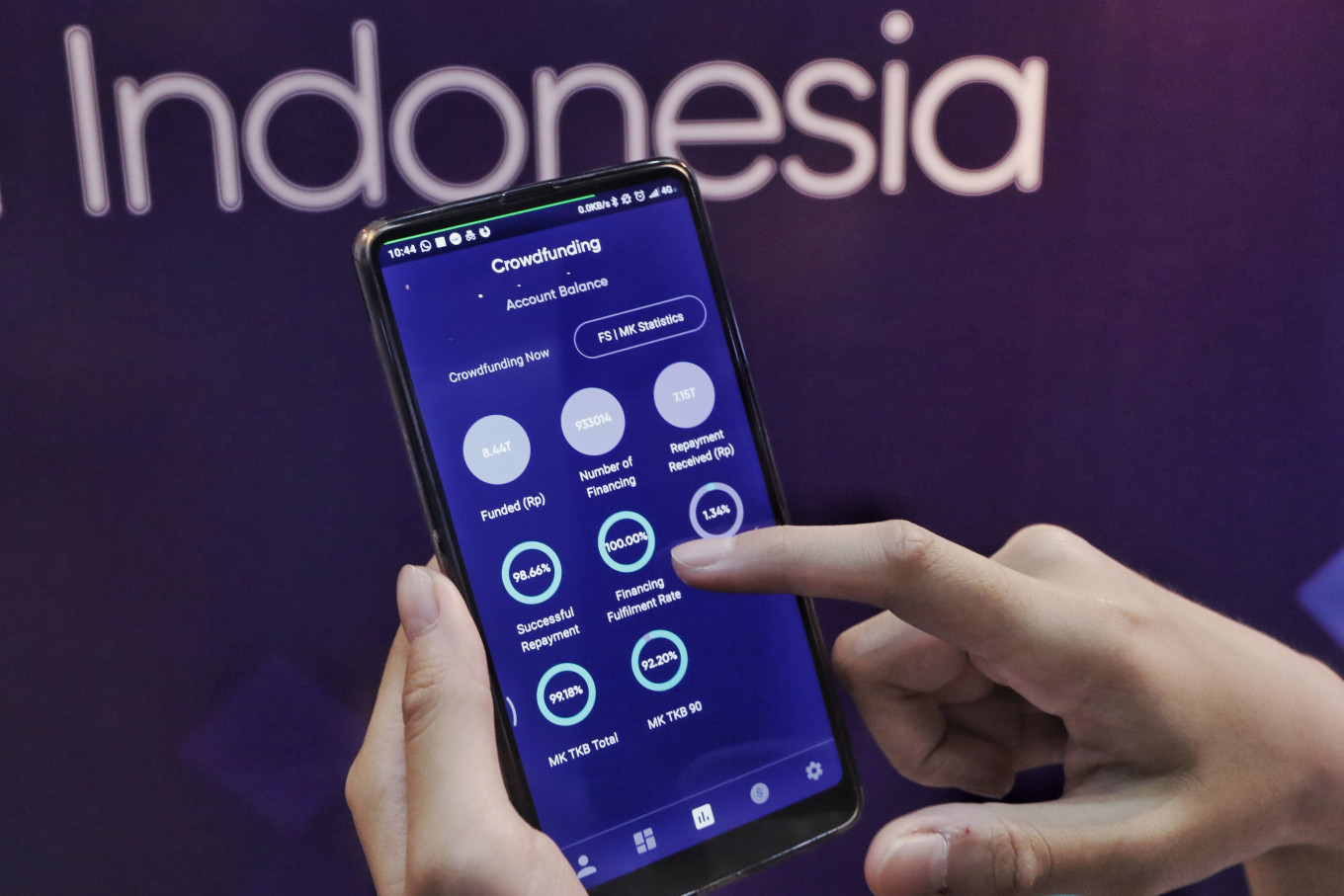Popular Reads
Top Results
Can't find what you're looking for?
View all search resultsPopular Reads
Top Results
Can't find what you're looking for?
View all search resultsAlternative data to financially boost Indonesia’s population
Many consumers remain “credit invisible” which translates to the lack of available credit history.
Change text size
Gift Premium Articles
to Anyone
 The Modalku application on smartphones that provide information technology-based loan services is exhibited at the Indonesia Fintech Forum 2019 in Jakarta, Wednesday (September 4, 2019). The financial technology (fintech) industry is currently growing rapidly, not least in Indonesia, according to the Financial Services Authority data in January 2019, the distribution of fintech funds reached Rp25.29 trillion. Rp22.67 trillion. (JP/Dhoni Setiawan)
The Modalku application on smartphones that provide information technology-based loan services is exhibited at the Indonesia Fintech Forum 2019 in Jakarta, Wednesday (September 4, 2019). The financial technology (fintech) industry is currently growing rapidly, not least in Indonesia, according to the Financial Services Authority data in January 2019, the distribution of fintech funds reached Rp25.29 trillion. Rp22.67 trillion. (JP/Dhoni Setiawan)
A
s digital adoption continues to accelerate in Indonesia, lenders are finding it challenging to identify the fast tracking of real time and updated data sources of online transactions. The country will witness a notable growth in digital transactions by 33.2 percent year on year to Rp 337 trillion this year from approximately Rp 253 trillion in 2020. Having said this, Indonesia’s lack of reliable data to make credit decisions has caused inefficiencies in the financial ecosystem.
This has initiated the need to look into alternative data which will provide a visual direction of the financial credibility of borrowers in the country. It will also give lenders an overview of payment defaults within a controlled risk. Alternative data is proven to complement traditional credit scoring methods which will inevitably lead to the increase of the number of consumers’ creditworthiness in the population.
It is common practice for lenders to look into alternative data when a borrower has no credit history background or is new-to-credit (NTC). Some examples include fresh graduates, first-time job seekers and residents in remote areas who have limited access to banks and financial services.
The assessment of alternative data can be conducted by incorporating private sector companies, fintechs and non-financial institutions. Using alternative data and leveraging digital consumption in a hyperconnected world can help build credit profiles quicker.
Having said this, fintechs such as CredoLab, uses a strategy that is unbiased, permission-based and consented to calculate a predictive credit score. Based entirely on harnessing non-personal smartphone metadata, CredoLab enables the entire population to secure the credit they deserve. Similarly, lenders adopting alternative data methods of credit scoring will potentially provide borrowers with the opportunity to secure a loan.
Alternative data essentially contains orthogonal or non-traditional data sets as compared to conventional methods of data scoring. This quality amplifies the overall predictiveness of an entire population’s portfolio and not just new-to-credit customers. According to research, incorporating alternative data into their loan process will assist lenders by allowing them to identify borrowers who are good credit risks while effectively screening out fraudsters.
Many consumers remain “credit invisible” which translates to the lack of available credit history. Lenders evaluate borrowers based on pre-existing data of borrowers credit files. This could potentially lead to good borrowers being denied access to credit because they cannot be separated from poorer risks. Alternative data is able to alter this decision making process.
90% of Indonesia’s 152 million internet users have made an online transaction at least once. This translates to the fact that they have been able to secure credit payment options when making the purchase. Merchants or third party lenders who made this possible have relied on previous information provided by the consumer and the readiness of a debit/credit card at the time of purchase.
On a larger scale, Indonesia’s population could have access to greater credit solutions if alternative data was made available to all. Depending on the needs of the industry and the database of consumers, alternative data methods will be able to provide lenders with additional credit insights. Lenders will also be granted the opportunity to expand their credit portfolios and which will result in the generation of financial inclusion in the country.
Alternative data will assist in bridging the gap between middle-income earners and lenders as by maximising loan approval rates and keeping the rate of bad debt at a controlled level. It will reduce data asymmetry between scorable and unscorable consumers. Those who are identified as credit invisible or have thin credit files with low credit history are able to secure a further boost to enhance their supporting scores. One of the most important functionalities of embedding alternative data into traditional data scoring, as previously mentioned, is the orthogonality of its concept.
Having access to financial services and credit capabilities will allow for societies to grow, businesses to thrive and economies to flourish. The potential for a financially inclusive ecosystem in Indonesia boils down to the availability of easy and equitable access to financial services. Harnessing the use of alternative data through behavioral credit scoring, non-personal metadata and internet penetration will show unprecedented opportunities in using technologies to achieve financial inclusion.
Previously non-lendable and unscorable consumers have benefitted from incorporating alternative data methods into traditional data scoring. Even though there is not a one-size-fits-all approach for all countries, depending on the economy and industry, alternative data sources are waiting to be a complementary method of scoring in order to provide the entire population with an equal access to financial services.
***
The writer is sales director and country manager of CredoLab









